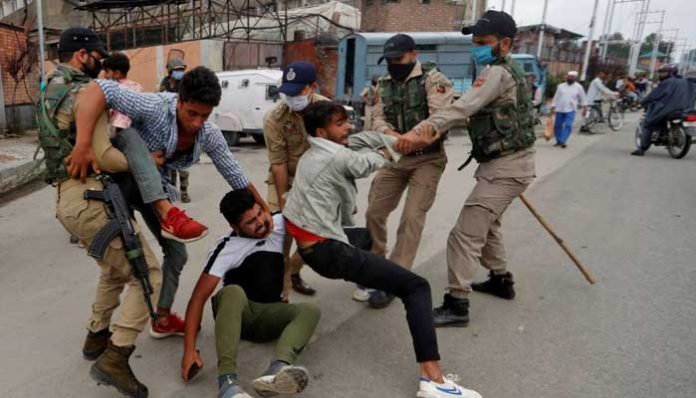This article is written by Hrithik Manchanda, from Manav Rachna University, Faridabad. This article deals with explaining the role of Article 21 in times of genocide with the help of the latest decision on the Rohingyas deportation case.
Table of Contents
Introduction
“The spirit of a man is in the root of Article 21.”
– Krishna Iyer, J
India is known to be a holy land of humanity and is very well known for its hospitality. So, the drafting committee while framing the Constitution of India had kept human dignity as the background and essence of the rights and liabilities mentioned in it. Article 21 of the Constitution is one such example that is known as the most beautiful Article which is not only applicable for citizens but also extends to non-citizens. The Supreme Court, in its landmark judgment of Maneka Gandhi v. Union of India, assured each and every person (whether citizen or noncitizen) the right to life and liberty which shall fall under the scope of Article 21. Article 21 is a warrior and a safeguard against the various violations of fundamental rights which may include genocide, crimes against women, and many more.
Understanding the genocide convention
The Genocide Convention was declared by the General Assembly on 11th December 1946 in its resolution 96(I). This convention deals with the prevention and punishment of attempting persecution or genocide in countries against an individual or group of individuals. Though India is not a signatory to the United Nations Convention on the status of refugees 1951 or the protocol of 1967 or the convention of the prevention and punishment of the Crime of genocide. Still it is important to understand the importance of the various international conventions.
Genocide convention is an instrument that abides by international law generally aims at codifying genocide as a crime. Genocide is defined as a practice of racial killing or creating a massacre among nations or traditional groups of people to destroy that nation or group.
Article 2 of the genocide convention entails a list of activities like killing members in a group, deliberately inflicting on the group conditions of life to bring physical destruction either in parts or whole, etc. which constitutes persecution.
Although the lists which are mentioned in Article 2 of the genocide convention are also threat to the liberty and life of an individual or group of individuals which are also in contravention to the principles of Article 21 of the Indian Constitution.
It is evident from the report of the Evangelical Fellowship of India (EFI) where it has reported that genocide and persecution have increased in the recent years against the Indian Christians after the appointment of the new government in 2014 and have recorded at least 328 incidents of targeted violence against Christians in 2019.
Principle of non-refoulement and Article 21
The principle of non-refoulement acts as a keystone and a foundation for the international refugee’s law and asylum. Article 14 of the Universal Declaration of Human Rights reflects the commitment of the international community to ensure to all persons the enjoyment of human rights, including the rights to life, to freedom from torture or cruel, inhuman or degrading treatment or punishment, and to liberty and security of person. It usually focuses on protection from the persecution in their respective countries and seeks shelter in asylums in other countries.
It is pertinent to mention the relation of these rights with Article 21 of the Indian Constitution which was understood in a recent judgment of Nandita Haskar v. Union of India & Ors. In this case where the petitioners were 7 Myanmarese students who were seeking protection from the United Nations High Commissioner for Refugees (UNHCR) as they were fearing persecution and physical damage in their native country and where the court held that the principle of non-refoulement has a great significance in the ambit of Article 21 of the Indian Constitution. The court further granted them safe passage to New Delhi so that they can avail themselves protection from UNHCR.
Genocide and the Citizenship Amendment Act, 2019
Recently in 2019, a controversial Citizenship Amendment Act, 2019 which was amended by the respective Rajya Sabha and Lok Sabha in order to protect the persecuted religious minorities from the neighboring countries. The Citizenship Amendment Act, 2019 is the revision of the early Act of 1955, which grants citizenship to the illegal migrants who are Sikh, Hindu, Christian, and Buddhist from the respective countries of Pakistan, Bangladesh, or Afghanistan. According to the Citizenship Amendment Act of 2019, only those among the above-mentioned migrants would be granted citizenship who entered India before 31st December 2014.
However, the said provisions of the CAA were in controversy as the government had not included persecuted Muslims like the Ahmadiyya Muslims or the Rohingyas Muslims in the said act which to an extent is a violation of Article 14 and Article 15 of the Indian Constitution. The government through this Act wanted to blow hot and cold air at the same time. The CAA itself is very contradicting in terms of the fundamentals of the Constitution when it is seen with the National Register of Citizens mostly referred to as (NRC) and Article 21.
The practice of bringing this Act into force has put a deep scar on the face of Indian democracy and the Indian Constitution as it provides a backdoor for the people of religion mentioned above and has left the persecuted Muslims in the detention centres. Needless to mention the situations of detention centres which are also highly violative of the fundamentals and spirit of the Indian Constitution.
Mohammad Salimullah v. Union of India & Ors. (the Rohingya Muslim deportation case)
Recently, a Public Interest Litigation (PIL) was filed by two of the Rohingya’s Muslims challenging the decision of deportation of the Rohingya’s Muslims who escaped their native country i.e Myanmar due to the fear of persecution and entered India to take refuge. The petitioners in their petition relied on the Reuters Report which reported that the government of India has decided to deport 40,000 Rohingya’s back to their native country in which there is a fear of persecution against them.
The contention of the parties
The petitioner filed an interlocutory application in the supreme court asking for interim protection and for the release of the detainees who were the Rohingyas Muslims at the state of Jammu. The petitioners in its petition mentioned two issues based on which the petition was maintainable. The first issue was that the principle of non-refoulement is a part of the right guaranteed in Article 21 of the Indian Constitution. The second issue that was raised by the petitioners was that the rights guaranteed under Article 14 and Article 21 of the Indian Constitution are available to non-citizens as well. The petitioners further relied on the judgment of Gambia v. Myanmar where the petitioner had filed an application against the respondent based on the genocide convention. Even the ICJ in the judgment noted that Myanmar’s assurance of ethnic reconciliation could not be trusted.
Reply by the respondents
The respondents in its contentions submitted that India is not a signatory to the UN Convention on the status of Refugees Act, 1957 or the Protocol of 1967. They further submitted that the petitioners are within the meaning of Section 2(a) of the Foreigners Act, 1946 and as per Section 3 of the Foreigner’s Act, the Central government has the power to issue orders relating to restricting or regulating and permitting the entries of the foreigners into India or their departure therefrom. The respondents also contended the issues of the petitioners and stated that the principle of non-refoulement is only applicable to the contracting states. Further, they also mentioned the issues which were relating to the threat to the internal society of the country of which was mentioned by the intelligence agencies.
The decision of the court
The Hon’ble Supreme Court partly agreed on the petition and held that the petitioner (Rohingya) would be only deported back to their native country once the government received confirmation from their country that the refugees would be welcomed back. While the court rejected all other claims that the petitioners were seeking in their petition.
The decision of the court as a good precedent
India has a culture of treating every guest as a god. The Hon’ble court has passed a judgment, defining the purview of Article 21 concerning non-citizens. The judgment clarifies that the right to life and liberty can be granted to non-citizens but it separates the fundamental rights including the right to the profession or to reside in any part of the country which are the fundamentals of Article 19 and is not guaranteed to the non-citizens.
This decision would help in the future to make a difference between the citizens and the non-citizens and would also create a bar so that Indian citizenship is not just distributed to the non-citizens otherwise India would become more of a rehabilitation centre.
Conclusion
Since genocide is not new in India of which Godhara Riots in 2002 or Sikh riots in the 1980s or the demolition of the Babri Masjid in 1992 are big examples. But the colonial laws like the IPC or Cr.P.C lack the provisions relating to these offences and do not have much power to deal with the crime when committed by large groups or when mass crimes are reported. The fieriest factor which is like fuel to the fire is that even after decades have passed and our judiciary is somewhere lacking as the cases of genocide that has happened in India, most of them are either getting investigated or recommendations to the new appointments are being made by different panels. while summarising the case of Mohammad Salimullah v. Union of India & Ors. It is also known as the Rohingya’s deportation case in which what they are demanding is not the privilege to become a citizen of India but just a shelter and basic amenities like food, clothes, etc. which is a humanitarian approach holding their right to survive even if survival is parallel to the animal’s existence.
References
- https://www.livelaw.in/top-stories/right-not-to-be-deported-fundamental-right-indian-citizens-supreme-court-rohingyas-case-172323
- https://www.scobserver.in/search?search_keyword=Mohammad+Salimullah+v.+Union+of+India+&search_type=all&sort_by=Relevance
- https://www.scobserver.in/court-case/rohingya-deportation-case
- https://www.britannica.com/topic/genocide
- https://www.google.com/search?q=principles+of+non+refoulement&client=safari&rls=en&sxsrf=ALeKk03RuN3eWymIIdKemSUnl04DkxwvSg%3A1620561070076&ei=rsyXYL-FBOjH4-EPi_6kkAw&oq=principles+of+non+re&gs_lcp=Cgdnd3Mtd2l6EAMYADICCAAyBggAEBYQHjIGCAAQFhAeMggIABAWEAoQHjIGCAAQFhAeMgYIABAWEB46BQgAEJECOggIABCxAxCDAToFCAAQsQM6CAguELEDEIMBOgQIIxAnOgQIABBDOgUILhCxAzoHCAAQsQMQQzoHCC4QsQMQQzoLCC4QsQMQxwEQowI6BwgAEIcCEBQ6BAgAEApQ9CxY51Ngi2FoAHAAeACAAaUBiAHeFJIBBDAuMjCYAQCgAQGqAQdnd3Mtd2l6wAEB&sclient=gws-wiz
LawSikho has created a telegram group for exchanging legal knowledge, referrals, and various opportunities. You can click on this link and join:
 Serato DJ Crack 2025Serato DJ PRO Crack
Serato DJ Crack 2025Serato DJ PRO Crack











 Allow notifications
Allow notifications


